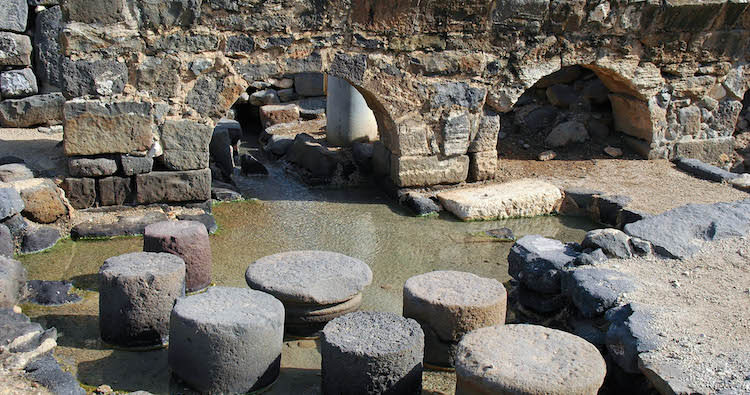(1) Hot Springs:
Bathing the whole body in hot water at once was forbidden on Shabbat, because it tempts people to heat the bath water. This prohibition was extended to entering a steam bath. However, the Sages discovered that extending the prohibition to the hot springs of Teveria was too much of a hardship for people, and this was permitted (SA OC 326:1).
We find several other instances where the hot springs of Teveria constitute an exceptional leniency. For instance, cooking in these springs on Shabbat is not a Torah prohibition (Shabbat 40b) and the same is true for cooking milk and meat in them (SA YD 87:6). What spiritual reality is behind these leniencies? What kind of fire warms the hot springs of Teveria?
The Torah says that the flood in the time of Noach was brought on by rains from above and by the bursting of “all the fountains of the great abyss” from below (Bereshit 7:11). Our Sages tell us that these springs flooded mankind with boiling hot water, to punish them for the sins they carried out in the boiling heat of passion. This recalls the view in the Talmud that these springs pass over the gates of Gehinnom (Shabbat 39a).
The message is that the fires of hell punish us measure for measure for the excesses of our own passions. A figurative understanding would be that when we face judgment and perceive our actions in the Divine light of truth, we are tormented by exactly those passions which led us astray.
When the flood ended, the Torah relates that HaShem sealed up “the fountains of the abyss” – but not all of them. Three were left unsealed, including the hot springs of Tiberias (Sanhedrin 108a). So the hot springs of Tiberias are heated by the fire of retribution; yet their water is used for healing and delight! (See Etz Yosef)
The fact that this same fire now benefits us shows that our passions are not all bad. The Midrash states that the so-called “evil impulse” is actually “very good”! (Bereshit Rabba on Bereshit 1:31) Our material nature, the so-called “evil” impulse is only “evil” when it is misused. When we rule our material nature and control it, then it is a source of strength and motivation.
However, even though our base nature can be exploited for good, we should not make the mistake of confusing it with our higher nature. A person can exploit his base impulses in God’s service, but these impulses can not provide the engine for true spiritual enthusiasm.
Our Sages say that there are no hot springs in Yerushalayim, because if there were, people would have them in mind when they make pilgrimages to the holy city (Pesachim 8b). The warm feeling we get from indulging our passions in moderation is not abhorrent, but we may not confuse it with true devotion to HaShem.
In Chasidic literature, we find that when halakha distinguishes between true fire and a lesser kind of heating, there is a spiritual analogy to the distinction between true spiritual fervor and material passion. Here are two examples:
Rav Nachman of Breslav explains that while a gentile can cook food, this cooking doesn’t elevate the food spiritually because pagan worship creates heat, but not light – they excite us but don’t enlighten us (Likutei Halakhot Meat with Milk, Maakhalei Akum.). The same should apply for the fires of material passion which heat the hot springs.
In a similar context, the Alter Rebbe explains that it takes the immense power of true fire, like the fire of Torah, to effect a genuine spiritual trans- formation (see Likutei Torah Lubavitch Matot 3). Again, the hot springs don’t measure up. These commentaries can explain why the fire of the hot springs, which stem from our base passions, don’t create a Torah prohibition of meat and milk.
On Shabbat also the forbidden material labors are often considered analagous to aspects of spiritual repair (see the column on carrying, Parshat Vayakhel 5760).The fire of our material passions are incapable of effecting true spiritual transformation, and therefore for Shabbat, as for milk and meat, the heat of the hot springs – whose spiritual source is in our lower impulse – is not considered true fire.
Rabbi Asher Meir is the author of the book Meaning in Mitzvot, distributed by Feldheim. The book provides insights into the inner meaning of our daily practices, following the order of the 221 chapters of the Kitzur Shulchan Arukh.
The words of this author reflect his/her own opinions and do not necessarily represent the official position of the Orthodox Union.
